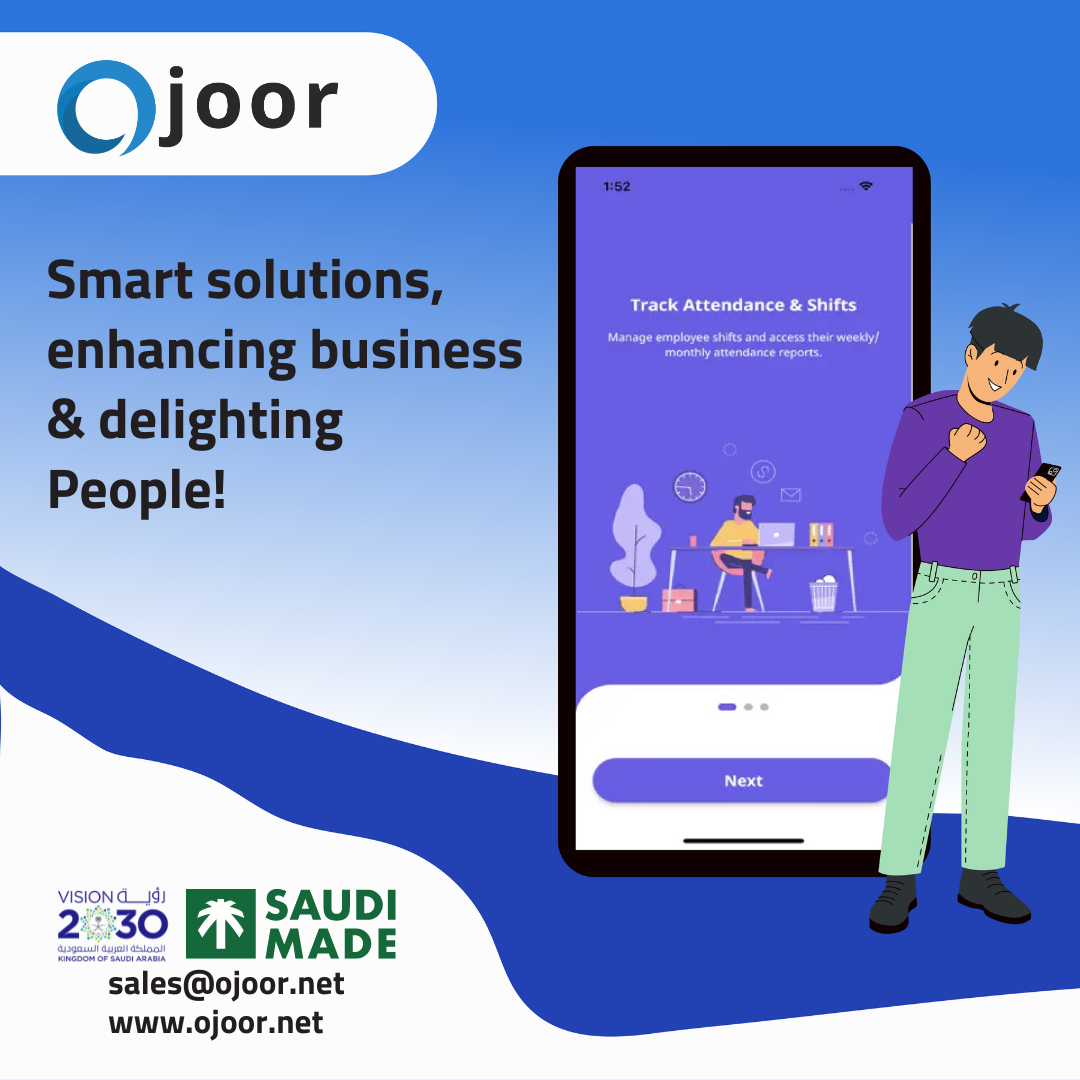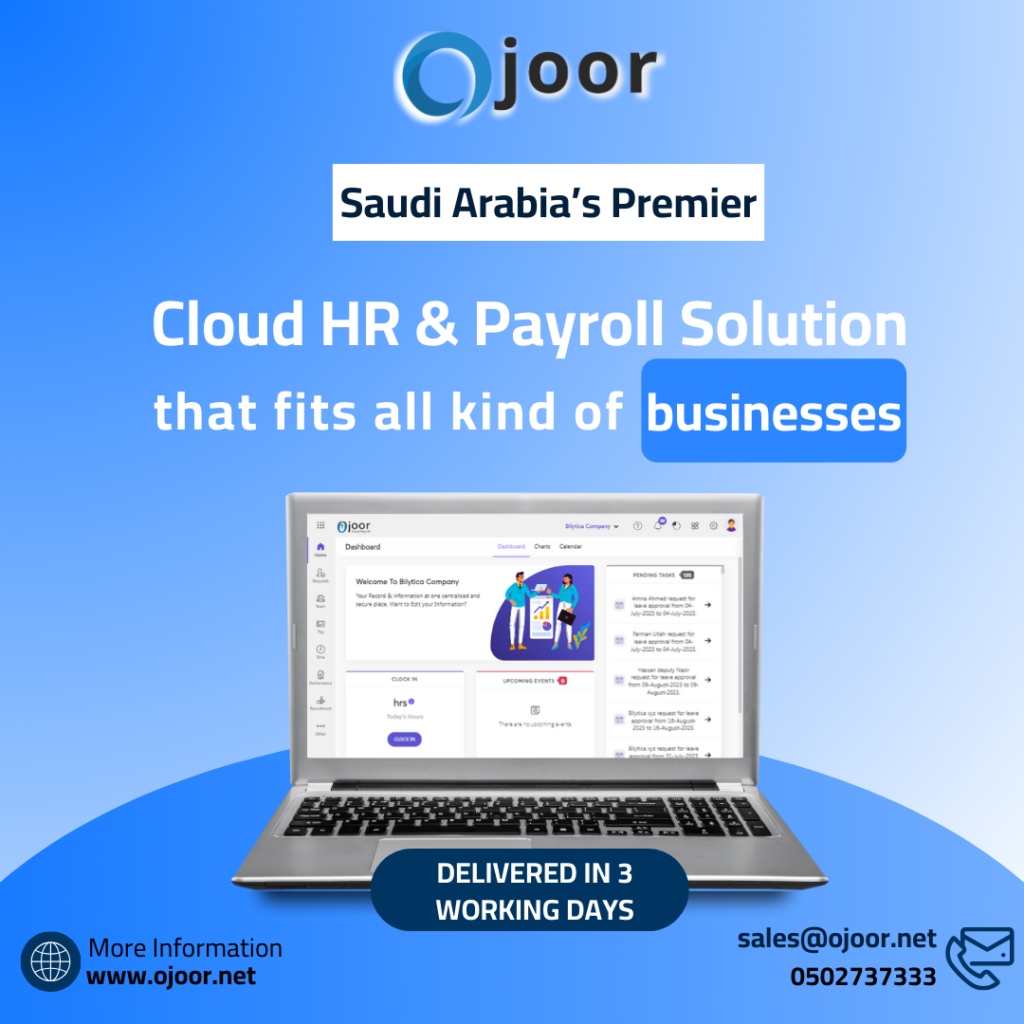Ojoor # 1 is one of the top Employee Management System in Saudi Arabia and other business systems and software is crucial for maximizing efficiency, data accuracy, and overall organizational productivity. In the context of Saudi Arabia, where businesses are increasingly adopting digital transformation strategies, the ability of an EMS to integrate with various systems is paramount. This article explores the importance of integration, the benefits it offers, the challenges involved, and specific considerations for Saudi Arabian businesses.
Click to Start Whatsapp Chatbot with Sales
Mobile: +966547315697
Email: sales@Ojoor.net
Ojoor #1 Employee Management System in Saudi Arabia

Importance of Integration
Integration capabilities allow an Employee Management System in Saudi Arabia to communicate and share data seamlessly with other essential business systems, eliminating silos and ensuring a unified approach to workforce management. This interconnectedness enhances operational efficiency, data accuracy, and decision-making processes across the organization. Key systems an EMS can integrate with include:
- Payroll Systems: Integration with payroll systems ensures that leave data and attendance records directly influence payroll calculations. This reduces manual data entry errors and ensures employees are accurately compensated based on their attendance and leave.
- Human Resource Information Systems (HRIS): Integrating with HRIS enables a holistic view of employee information, combining leave management and attendance tracking with employee profiles, performance data, and training records. This integration supports comprehensive employee management and strategic HR planning.
- Time and Attendance Systems: Integration with time and attendance systems ensures real-time tracking of employee clock-ins, breaks, and clock-outs. This data feeds directly into the EMS, providing accurate attendance records for leave management and payroll purposes.
- Performance Management Systems: Integration with performance management systems allows HR teams to align leave management data with employee performance metrics. This integration supports informed decisions regarding promotions, training needs, and performance evaluations.
- ERP Systems: Enterprise Resource Planning (ERP) systems integrate various business processes, including finance, procurement, and inventory management. Integrating an EMS with ERP systems ensures that HR-related data flows seamlessly across the organization, supporting overall operational efficiency.
Benefits of Integration
Streamlined Processes
Integration eliminates redundant data entry and manual processes, saving time and reducing administrative burdens. For example, when an employee’s leave request is approved in the Employee Management System in Saudi Arabia the updated information automatically reflects in the payroll system, ensuring payroll accuracy without additional manual inputs.

Data Accuracy
Manual data entry is prone to errors, which can lead to payroll discrepancies and compliance issues. Integration ensures that accurate data flows between systems in real time, minimizing errors and enhancing data integrity.
Improved Decision-Making
Access to consolidated and real-time data enables HR System in Saudi Arabia and management teams to make informed decisions. For instance, integrated systems provide insights into workforce productivity trends, allowing proactive management of leave policies and resource allocation.
Enhanced Employee Experience
Seamless integration supports a better employee experience by reducing delays in leave processing and ensuring timely payroll disbursements. Employees can access their leave balances and attendance records through self-service portals, fostering transparency and empowerment.
Cost Efficiency
Integration reduces operational costs associated with manual data entry, reconciliation errors, and administrative overhead. Organizations can allocate resources more effectively, focusing on strategic initiatives rather than routine administrative tasks.
Challenges of Integration
While integration offers numerous benefits, there are challenges that organizations need to address:
- Compatibility Issues: Ensuring compatibility between different software solutions and versions can be complex, requiring IT expertise and potentially customized solutions.
- Data Security Concerns: Integrating systems involves sharing sensitive employee data across platforms. Organizations must implement robust data security measures to protect against breaches and ensure compliance with data protection regulations.
- Technical Complexity: Integration projects often require technical expertise and resources to configure APIs, data mappings, and synchronization processes between systems.
- Change Management: Adopting integrated systems may require cultural and organizational changes. Proper change management strategies are essential to gain user acceptance and maximize the benefits of integration.
Considerations for Saudi Arabian Businesses
In the Saudi Arabian context, several factors influence the integration of an EMS with other business systems:
- Compliance with Regulations: Ensure that integrated systems comply with Saudi labor laws and data protection regulations, such as the General Data Protection Regulation (GDPR) and the Saudi Data and Privacy Law.
- Cultural Considerations: Saudi Arabia has a diverse workforce with varying cultural norms. Integration should consider cultural sensitivities and communication preferences when implementing new systems.
- Localization: Ensure that integrated systems support LMS training language interfaces and comply with local business practices and regulatory requirements specific to Saudi Arabia.
- Scalability: Consider the scalability of integrated systems to accommodate business growth and expansion plans in the Saudi market. Scalable solutions can adapt to evolving organizational needs and technological advancements.
Conclusion
Integration of an Employee Management System with other business systems is essential for enhancing operational efficiency, improving data accuracy, and supporting informed decision-making in Saudi Arabian organizations. By streamlining processes, ensuring data integrity, and promoting a seamless user experience, integrated systems contribute to overall organizational success. However, challenges such as technical complexity and data security concerns require careful planning and implementation. Saudi Arabian businesses can leverage integration to achieve greater productivity, compliance with regulations, and employee satisfaction, ultimately driving business growth and competitiveness in the dynamic market landscape.
Click to Start Whatsapp Chatbot with Sales
Mobile: +966547315697
Email: sales@Ojoor.net
Employee Management System in Saudi Arabia
Employee Management System in Saudi Arabia
Employee Management System in Saudi Arabia
Employee Management System in Saudi Arabia integrate with business similar software solutions prices were updated on 2025-07-13T05:57:59+00:00 in Saudi Arabia in Mecca, Medina, Riyadh, Khamis Mushait, Yanbu, Jeddah, Dammam, Unaizah, Uqair, Ha’il, Ta if, Al Bahah, Dhahran, King Abdullah Economic City, Najran, Diriyah, Qatif, Khafji, Jubail, Abqaiq, List of Cities and Towns in Saudi Arabia, Ras Tanura, Turubah, Jazan Economic City, Knowledge Economic City, Medina, Khobar, Abha, Tabuk, Saudi Arabia, similar software solutions prices were updated on 2025-07-13T05:57:59+00:00 We also provide in Saudi Arabia services solutions company in Hafar Al-Batin, Udhailiyah, Al-Awamiyah, Hofuf, Hautat Sudair, Buraidah, Tayma, Duba, ‘uyayna, Saihat, Al-Kharj, Al-ula, Jizan, Rumailah, Ar Rass, Arar, Shaybah, Al Majma’ah, Rabigh, Dhurma, Haradh, List of Saudi Cities by Gdp Per Capita, Badr, Sudair Industrial City, Baljurashi, Shaqraa, Al-Khutt, Habala, Ad Dawadimi, Dawadmi, Layla, similar software solutions prices were updated on 2025-07-13T05:57:59+00:00 Price is SAR 100 and this was updated on updated on 2025-07-13T05:57:59+00:00 similar Employee Management System in Saudi Arabia integrate with business software solutions prices were updated on 2025-07-13T05:57:59+00:00 in Saudi Arabia in Haql, Afif, Al-Abwa, Farasan, Al-Jaroudiya, Thadig, Al-Thuqbah, Al Wajh, Almardmah, Al-Zilfi, Muzahmiyya, Prince Abdul Aziz Bin Mousaed Economic City, Tharmada’a, Skaka, Um Al-Sahek, Sharurah, Tanomah, Bisha, Dahaban, Al Qunfudhah, Qurayyat, Saudi Arabia, Ha’ir, as Sulayyil, Al Lith, Turaif, Al-Gway’iyyah, Samtah, Wadi Ad-Dawasir, Az Zaimah, Safwa City, Jalajil, Harmah, Mastoorah, Hotat Bani Tamim, Jabal Umm Al Ru’us, Rafha, Qaisumah, Al-Ghat, Hajrah, Al-Hareeq. Excerpt: Jeddah (also spelled Jiddah, Jidda, or Jedda; Arabic: Jidda) is a Saudi Arabian city located on the coast of the Red Sea and is the major urban center of western Saudi Arabia similar software solutions prices were updated on 2025-07-13T05:57:59+00:00 Price is SAR 100 and this was updated on updated on 2025-07-13T05:57:59+00:00
6-14-2024

